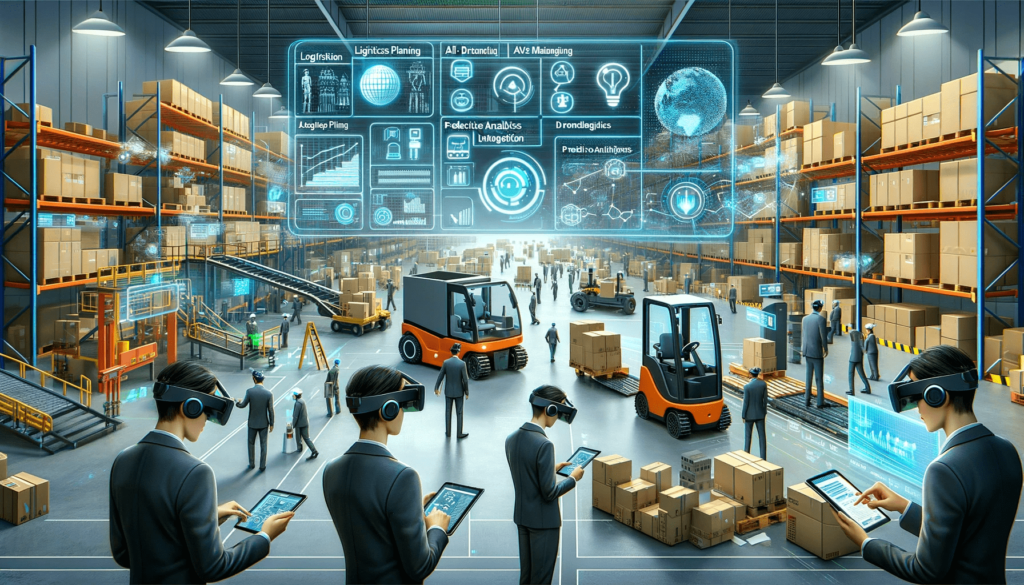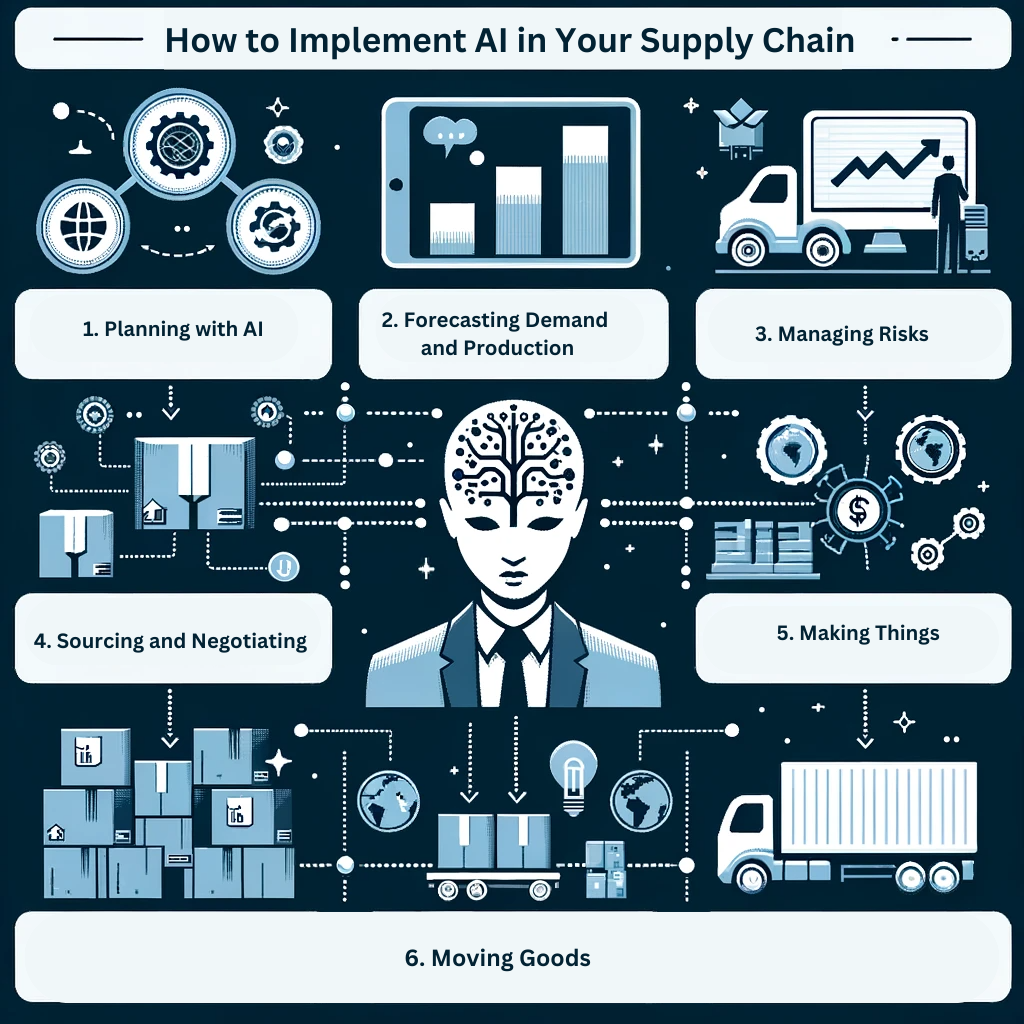In an era where the pace of technological innovation is uncompromising, the Industrial Internet of Things (IIoT) and Artificial Intelligence (AI) are redefining the frontiers of efficiency and customer-centricity in supply chain management.
Big Research Firms like Gartner, have predicted, that the integration of smart, interconnected tools within supply chains is not just a trend but a transformative shift, particularly vital for smaller companies operating on tighter budgets.
These organizations are now turning towards cloud-based technologies and Generative AI-powered software solutions like Chatbots and Virtual Assistants, Natural Language Processing, and Machine Learning, heralding a new era of smarter supply chain systems.
This transition is more than a mere upgrade; it’s a strategic necessity. According to PwC, a globally recognized consultancy, AI is not just a tool but a game-changer, poised to contribute an astounding $15.7 trillion to the global economy by 2030. Its implementation is making supply chains more agile, efficient, and cost-effective, automating processes that were once manual and time-consuming.

As we delve into the role of AI in supply chain management, we uncover not just its transformative impact but also its necessity. In a world where 47% of established organizations are actively integrating AI [source] and automation into their supply chains, standing on the sidelines is no longer an option.
Contents
- Benefits of AI in the Supply Chain
- Challenges of AI in Supply Chain Management
- Building a Future-Proof AI Supply Chain:
- How to Implement AI in Your Supply Chain
- Why Supply Chain is a Natural Fit for AI?
- Examples of AI in Supply Chain Management
- Why is the Human Factor Still Important for AI?
- Upgrading Your Supply Chain – How To Get Started?
Benefits of AI in the Supply Chain
Integrating AI into supply chain management has been a game-changer for many businesses. AI-driven solutions in warehouse logistics, quality checks, inventory, and supplier management have revolutionized these processes. They automate routine tasks, boost accuracy and efficiency, and support sustainable practices.
Here’s how a fully AI-optimized supply chain can benefit companies:
- Reduced Operating Costs: AI-driven SCM enables cost savings by cutting down purchasing and production expenses. Direct procurement, like a grocery store sourcing vegetables straight from the farmer, eliminates third-party costs and speeds up availability. AI also offers transparent data for enhanced supply chain visibility and cost efficiency.
- Increased Productivity and Lower Labor Costs: Manual task automation through AI improves efficiency and reduces the reliance on human labor, leading to significant cost savings.
- Strengthened Relationships in the Supply Chain: Effective relationship management ensures a balanced stock level, avoiding overstocking or shortages, and strengthens ties with suppliers, manufacturers, distributors, and retailers.
- Faster and Punctual Deliveries: AI’s capability to analyze data and identify patterns ensures the timely delivery of goods. For instance, Walmart utilizes AI to optimize inventory levels and expedite fresh food delivery, enhancing customer satisfaction [source].
- Optimized Transportation Networks: AI determines the most efficient transport routes, considering factors like truck capacity, fuel usage, and travel time. UPS, for example, uses AI for route optimization, improving package delivery efficiency.
- Mitigated Risks: AI tools can detect potential risks in warehouse management systems, allowing businesses to proactively address safety concerns and operational inefficiencies.
- Improved Decision-Making: While AI doesn’t replace human decision-makers, it enhances decision-making processes by analyzing vast amounts of data quickly and providing insightful, actionable intelligence.
Partnering with Generative AI development company like RedBlink Technologies can further elevate these benefits, offering tailored AI solutions that align with specific business needs and goals. This strategic collaboration not only streamlines supply chain management but also propels businesses towards innovation and sustainable growth.
Challenges of AI in Supply Chain Management
While AI in supply chain management offers tremendous benefits, several challenges stand in the way. These include complex system integration, talent acquisition and retention, ethical considerations, human-AI collaboration, and the need for continuous adaptation. Overcoming these obstacles requires a comprehensive approach that addresses each challenge holistically.
Building a Future-Proof AI Supply Chain:
The key to successfully navigating these challenges lies in investing in a robust AI strategy. This strategy should encompass:
- Talent Pipeline: Acquire a dedicated team of AI specialists, data engineers, and integration experts who can implement, maintain, and optimize AI solutions. You can partner with US based AI consulting firms to fill any skill gaps.
- Ethical Framework: Establish a clear AI ethics framework that promotes responsible data usage, mitigates bias, and ensures transparency in decision-making. Seek guidance from AI development companies to build trust and avoid potential reputational risks.
- Agile Adaptation: Foster a culture of continuous learning and innovation within your organization. Stay updated on the latest AI advancements and leverage ongoing training and development programs to equip your team to adapt to the rapidly evolving AI landscape.
- Human-AI Harmony: Bridge the gap between humans and AI by providing your workforce with upskilling opportunities to understand and collaborate effectively with AI systems. Promote a culture of trust and ensure human oversight for critical decision-making.
By strategically focusing on these core areas, businesses can transform the challenges of AI in supply chain management into opportunities for growth and optimization. Investing in the right talent, infrastructure, ethical framework, and continuous adaptation will unlock the transformative potential of AI, revolutionizing your supply chain and propelling your business into the future.
How to Implement AI in Your Supply Chain

Implementing AI in your supply chain might sound complex, but it’s really about using smart technology to make everything run smoother and more efficiently. Here’s how you can do it in simple terms:
- Planning with AI: Think of AI as a super-smart helper that can make your planning process a breeze. Several AI planning tools are there to streamline planning by forecasting and managing risks. Such AI platforms anticipate the effects of global events on supply, offering alternative strategies and identifying hidden risks.
- Forecasting Demand and Production: There are various AI software that utilize machine learning to analyze past sales and market trends. This enhances inventory management and production planning, ensuring optimal stock levels and efficient production schedules.
- Managing Risks: Employ such AI solutions that act as intelligent risk detectors to assess various data points, including weather and geopolitical events, to foresee supply chain risks and provide preemptive strategies for mitigation.
- Sourcing and Negotiating: AI platforms also revolutionize sourcing and negotiations. Such AI tools assist in securing the best supplier deals, optimizing contract management, and improving decision-making, ultimately enhancing procurement excellence.
- Making Things: AI can speed up how quickly you go from designing something to making it. It helps find ways to make your production more efficient and can predict when machines might break down, saving you time and money.
- Moving Goods: Finally, there are various AI software that help in getting your products to where they need help. These AI tools can figure out the best routes for delivery, taking into account things like traffic and weather. This means faster deliveries and happier customers.
So, if you’re looking to make your supply chain more efficient and smarter, getting the assistance of AI experts is an essential step. It can make a difference in every part of the process, from planning to delivering goods.
Why Supply Chain is a Natural Fit for AI?
The intricate and data-driven landscape of supply chain management naturally lends itself to the integration of generative AI and cognitive computing.
In response to this, Chief Operating Officers (COOs) and Chief Supply Chain Officers (CSCOs) are increasingly embracing the power of AI, particularly in generative AI development services to drive efficiency and innovation within their supply chains.
Hiring skilled AI professionals in supply chains can help build a tailor-made generative AI solution that significantly enhance various aspects of its operations. These services empower businesses to elevate material quality, streamline inventory management, and fortify risk mitigation strategies throughout the entire supply chain.
Machine learning, a fundamental component of generative AI, plays a pivotal role in accurately forecasting demand trends and optimizing product lifecycle management. This technology contributes to strategic planning by facilitating the navigation of fluctuating demand and supply constraints, providing decision-makers with invaluable data-driven insights.
Furthermore, the manufacturing sector is experiencing a transformative shift with the introduction of AI, particularly through generative AI development services.
Collaborative robots, equipped with advanced AI algorithms, operate seamlessly alongside human counterparts, boosting efficiency while ensuring safety. This innovative incorporation of AI into manufacturing processes underscores the immense potential of generative AI development services to revolutionize industry practices.
The synergy between the intricacies of supply chain management and the capabilities of AI, especially through the implementation of customized generative AI solutions underscores why AI is a natural fit for supply chains.
Supply chain companies that aim to optimize their processes and maintain a competitive edge in the market are increasingly turning to hiring artificial intelligence engineers. These professionals not only help you to enhance current operations but also strategically shape future business models, paving the way for enhanced efficiency and profitability.
Examples of AI in Supply Chain Management
Did you know that Vorto collaborates with key stakeholders in the supply chain to optimize operations and reduce carbon emissions through AI-driven platforms?
Early adopters of AI-enabled supply-chain management have improved logistics costs by 15%, inventory levels by 35%, and service levels by 65% compared with slower-moving competitors. Source
Well, not only this, Coupa also empowers supply chain companies to make data-driven decisions by analyzing logistics data, including variables such as tariffs and environmental events.
Apart from Vorto and Coupa, Epicor also leverages Microsoft Azure to enhance its business solutions, including supply chain management, using cloud-based AI solutions.
These examples highlight the transformative potential of AI in streamlining supply chain and logistics processes, ultimately leading to improved operations and sustainability efforts.
To get into more depth, check our post: Top 10 AI Consulting Companies for Small Businesses & Startups in 2024
Why is the Human Factor Still Important for AI?
Using AI technology is helpful, but we shouldn’t forget the importance of people in the process. People bring things to the table that AI just can’t match, like the ability to make ethical decisions, be creative, understand emotions, and take responsibility for actions.
Even though AI machines can do things quicker and with fewer mistakes, humans add a personal touch with their expertise, gut feelings, emotional understanding, and cultural insights. When we combine AI with human workers, we end up making smarter decisions and coming up with more innovative ideas for all sorts of jobs.
AI is here to make human skills even better, not to take their place. This is where AI development services come in – they’re all about creating AI tools that complement our human strengths, making our work more efficient and effective.
Upgrading Your Supply Chain – How To Get Started?
Before diving into new technologies, assess your digital readiness with these three steps:
1) Set Realistic Expectations:
Before implementing AI, conduct a self-awareness test.
- Gather key stakeholders
- Ask important questions about targets and goals.
- Quantify short and long-term expectations against implementation costs, including technology expenses, temporary disruptions, and labor costs.
- Establish new KPIs related to high-level goals and understand how AI impacts specific operations.
Remember that AI benefits are cumulative; focus on long-term efficiency gains.
2) Evaluate Technology Usage:
- Assess your organization’s readiness in terms of people, skills, and tools.
- Identify the need for specialized personnel, and training, and assess technology stack interoperability.
- Consider data collection, storage efficiency, open-source technologies, and the location of your tech stack.
This assessment involves both personnel and enterprise-wide planning.
3) Harness Your Data:
- Data is essential for AI; you likely have more data than you realize.
- Focus on consolidating existing data rather than collecting new data.
- Break down data silos, address cultural and process challenges, and encourage cross-team collaboration.
- Segregated business units before digital transformation to ease the process and assess readiness.
AI is transforming supply chain management. Whether you’re just starting your digital transformation journey or ready to implement AI, these steps will guide your path forward.
For more information about the role of AI in supply chain management, or to get AI development services, feel free to contact the expert AI developers of RedBlink Technologies today! RedBlink is an AI consulting and generative AI development company, offering a range of services in the field of artificial intelligence. With their expertise in ChatGPT app development and machine learning development, they provide businesses with the ability to leverage advanced technologies for various applications. By hiring the skilled team of ChatGPT developers and machine learning engineers at RedBlink, businesses can unlock the potential of AI and enhance their operations with customized solutions tailored to their specific needs.

Director of Engineering | CTO | Software Developer
As a passionate technologist and seasoned software developer, I specialize in creating innovative solutions at the intersection of AI and software engineering. With a keen interest in leveraging the latest technologies to solve real-world problems, my work spans developing advanced AI models to designing scalable software architectures. Beyond coding, I contribute to tech blogs, sharing insights on AI trends, software best practices, and the future of technology. My mission is to empower organizations and individuals through technology, driving forward the boundaries of what’s possible
